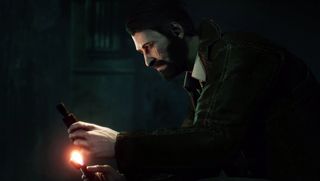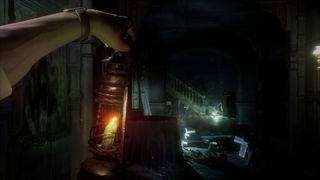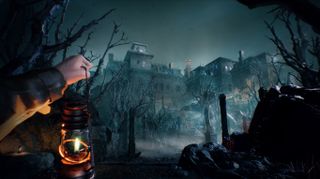Call of Cthulhu makes an eerie RPG of survival horror and detective work
Stay with me here: it’s a walking sim RPG with Ace-Attorney-lite detective sections and sanity-driven survival horror. And it’s cool? It’s cool.

The most interesting part of the live demonstration I saw of Call of Cthulhu wasn’t when the eyeless monster crawled out of a painting. It was the heart attack the main character nearly had hiding in the closet while he watched it happen. Had he stayed in any longer, it’d be game over.
He has a fear of small, enclosed spaces, but that won’t necessarily be the case for everyone. Like Amnesia: The Dark Descent, Call of Cthulhu is a first-person survival horror game with a sanity system. See too many strange things, read too much impossible knowledge and you have a chance to get hit with a phobia, but exactly what that phobia is will vary.
So picture this: a Gone-Home-esque detective game with investigation scenes that play out like Ace-Attorney-lite, interspersed with puzzle and monster evasion sections. And as you flee in terror, you'll possibly be kneecapped by an assortment of random fears. Tight.
Jeepers, a clue!
Investigation scenes play out exactly like Gone Home, but with stats. Hell yeah, stats! You’ll look around a room for clues and the number you can ‘investigate’—in videogame terms they’re the objects you can interact with by pressing a button, which gives you information—is determined by your Profession skill level. You literally won’t be able to interact or ‘notice’ all the clues in a room without a high enough skill level in some instances. Beyond that, a Knowledge skill level determines your ability to understand those clues, so even if you find everything in a room because you’ve juiced that Profession number, the character won’t be able to pull as much detail from them.
In an example we saw, the player pressed X to investigate a painting, but didn’t notice the flames painted in the background. The whole narrative impetus is based around investigating a strange police report describing the death of some folks in a spooky, island mansion, so flames in the background of their portrait should pique some curiosity at the very least. This dolt didn’t notice a damn thing. He just said something like, ‘Hmm, two people in a painting. Curious.’

It’s weird, because as a player, you might notice such a detail, but because you’re roleplaying a doofy, gruff detective, his skills might not be high enough to notice. The more items you investigate and understand, the more options you have to hold up against the police report from the incident that took place in the house you’re investigating. Once a room is cleared of clues, the character says something to indicate it’s time to think. At that point you can bring up a menu that lists all the clues next to whatever you’re currently trying to prove or disprove.
The police report said the fire started around midnight, but we found a burned clock with the hands stuck at 10 pm, so we checked a box next to that clue. After checking boxes next to a few more clues contradicting the report, the clues are submitted and if they do the trick, you complete the objective and can move on. I’m not sure how you can fail these sections, and what happens if you do, but it’s a fun, light touch spin on walking sim types.
PC Gamer Newsletter
Sign up to get the best content of the week, and great gaming deals, as picked by the editors.
Talk it out
The more thoroughly you disprove something, the more XP you earn. That earns you skill points for upgrading Investigation and Profession skills, but you can also dump them into Social. Throughout Call of Cthulhu, you’ll meet more than a dozen characters, all of whom you’ll have a ‘status’ with based on how your interactions with them go. They can be used to subvert investigation scenes at times as well, so if you’d rather talk your way through a scenario, it’s possible.
Even though you’ll get XP for thorough investigations, the chance of seeing something that fills up your sanity meter increases.
Right at the outset, we needed a key to get into the mansion. The groundskeeper confronted us outside the front door, a grumpy old dude, and we had the option to intimidate, lie, or use a clue to persuade him. Because we noticed some fresh flowers on a grave on the walk up, the persuade option worked just fine. We offered to shed some light on the tragedy, telling him, ‘I saw the flowers you left,’ and it hit home. The successful interaction gave us some XP and he handed over the key. But if we had a high enough Social skill, we could’ve just lied or intimidated him, though each option has its own skill check based on what the character would be most susceptible to.
All of these systems coexist with a sanity system, which goes up the more you see or read Lovecraftian things. The implication is that even though you’ll get XP for thorough investigations, the chance of seeing something that fills up your sanity meter increases. And when it reaches a certain point, you’ll get a new phobia, a fear that has a severe impact on how you play.
As mentioned earlier, in our demo a monster climbed out of a painting and when the player ran and hid in a closet, their heart rate increased at a steady rate. Any longer and it’d be game over. I like the idea of hitting the most thorough players with random modifiers that force them into bizarre playstyles, but I’ll need to see what the other fears entail before getting too into it.

Let's be real: I love injecting RPG systems into everything I can. Give me a shoe that gathers XP for stepping well and has a skill tree for extraneous step flourishes, like toe strength and heel impact. But I don’t quite understand how the skill points and XP will distribute throughout Call of Cthulhu. It’s not like you can grind out investigations, so there must be a finite amount of XP in the game, and a finite number of skill points as a result.
Can my investigation skill be so low that I literally can’t complete the game? If my character is incapable of socializing at all, will I get a special brand of fail state? Honestly, I hope so. If the skill points and RPG systems are just a flourish for a semi-linear narrative game, I’ll feel cheated. I want to be forced to role-play, to think like a depressive detective with perpetual five o’clock shadow and a weak ticker. Don’t we all?
For more on Call of Cthulhu, read our feature on how Cyanide thinks it can successfully capture Lovecraft.
James is stuck in an endless loop, playing the Dark Souls games on repeat until Elden Ring and Silksong set him free. He's a truffle pig for indie horror and weird FPS games too, seeking out games that actively hurt to play. Otherwise he's wandering Austin, identifying mushrooms and doodling grackles.
Most Popular


